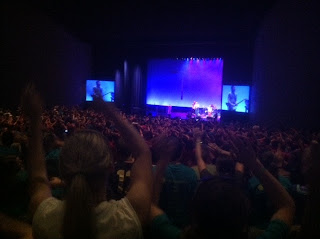I promised last post to share some of the experiences that filled autumn semester, but Christmas Break distracted me. For today, I would like to recount the rather astounding soccer season we enjoyed on the hilltop.
First, let me offer some context for our soccer program. Some of this may be repeated information, but to understand the fullness of our team's story, it ought to be shared again. We play in the Cascade Collegiate Soccer League at a club level against squads from area schools--Central Oregon Community College, Lewis & Clark College, Oregon State University, Portland State University, Reed College, and Willamette University. Last season we won two out of ten games, and our record was celebrated by the seminary as the finest anyone could remember. Our leading goal scorer and captain graduated, and only six players returned to the team this year.
I served as the player-coach after playing for the team last autumn, and I tempered my expectations internally though I was hopeful the season could be a success for reasons other than winning. (Fraternity and the cultivation of virtue are excellent reasons to play even for a losing outfit.) When I arrived back at seminary in late August, I met a number of new students interested in playing for the team, and to my surprise, many of them were very able soccer players. We had 22 players sign up, and 20 played in games at some point. That is an achievement in participation.
After beginning training in September, we started our league schedule with a 4-4 tie against Willamette on our muddy, mismeasured home field. They were furious with themselves for letting the minnows from Mount Angel play them even, but we weren't finished surprising opponents. We went undefeated in our first four games. We won six out of ten games. We tied two. We lost only twice. We were the only team to take points from the top two teams in the league. We had the leading scorer in the league. We achieved more than anyone, including us, had expected at season's beginning. To understand why this is incredible, one must grasp the competitive disadvantages we faced.
Our school draws from about 150 students, many of whom cannot make the time commitment to play a sport. Reed College has 1,400 students. Willamette has 2,000 undergraduate students. Lewis & Clark has 3,700. Central Oregon is a tick above 7,000. Oregon State? Almost 28,000. Portland State? 29,500.
Our athletic budget at Mount Angel is $4,500 for all three of our team sports (basketball, soccer, and volleyball) plus any incidental costs to repair athletic or recreational facilities. Our home games are played on a pitch that doubles as the home of a gopher family and boasts some of the ruddiest terrain between the lines of any regulation playing field. The goal posts are set in cement but were not placed parallel to each other, so one sideline is 18 feet longer than the other. The place becomes a mud pit when the autumn rains fall. Even the gate to get into the field doesn't get unlocked on game days. We have to go around the fence and through a puddle-filled passageway opened up by thousands of footsteps sneaking around the fence's edge. When we don't play on the field, we put up small goals in our gym, where the seal on the hardwood floors is coming up like candy wrappers, and the walls, doors, stage curtain, and rafters present unique challenges to the flow of the game.
We didn't have enough white uniforms to outfit all our players, so we wore blue each game. Our limited window of practice time was for one hour, 4-5 p.m., on Tuesdays, Wednesdays, and Thursdays, assuming we didn't have another event for the seminary that conflicted. Only about half of the team could come to each training session, and even that number dwindled at the end of the season.
Quite simply, we competed in a way that our competitive disadvantages should not have allowed us to compete. The schools in our league fielded teams that drew from vastly larger student pools, probably practiced 4-5 days a week for two hours a practice with superior facilities, less time-consuming responsibilities for school, and more money to finance their endeavors. Yet we competed and even won.
As coach, I am proud of the team results, but as a brother seminarian of my teammates, I think we ought to take more pride in the practices we attended, the sacrifices we made, the friendships we built, the patience we exercised, the fortitude we developed, the humility we learned, the integration of faith we implemented, and the witness we offered.
During finals week, I sat at my desk reviewing notes for an exam I would take in the morning when I heard a commotion in the hallway. This isn't unusual. After a minute or so of hearing a large and growing group of voices outside my door, someone knocked. My teammates had all broken their studies to say thank you to me for coaching. They presented to me a soccer ball each one of them had autographed. Even our two diehard fans joined in the group. Not knowing what else to say, they started a rendition of happy birthday. I was humbled and grateful for their gesture.
At its core, soccer is a simple endeavor--22 players trying to put a round ball in the opponent's goal. Setting aside the offside rule and the intricacy of tactics, soccer is a competition with the potential to teach life lessons and cultivate virtue. If we did that this season, even had we gone winless, God would have granted success to the work of our hands. That we experienced a few victories made the culmination even finer. It was a great season.







































